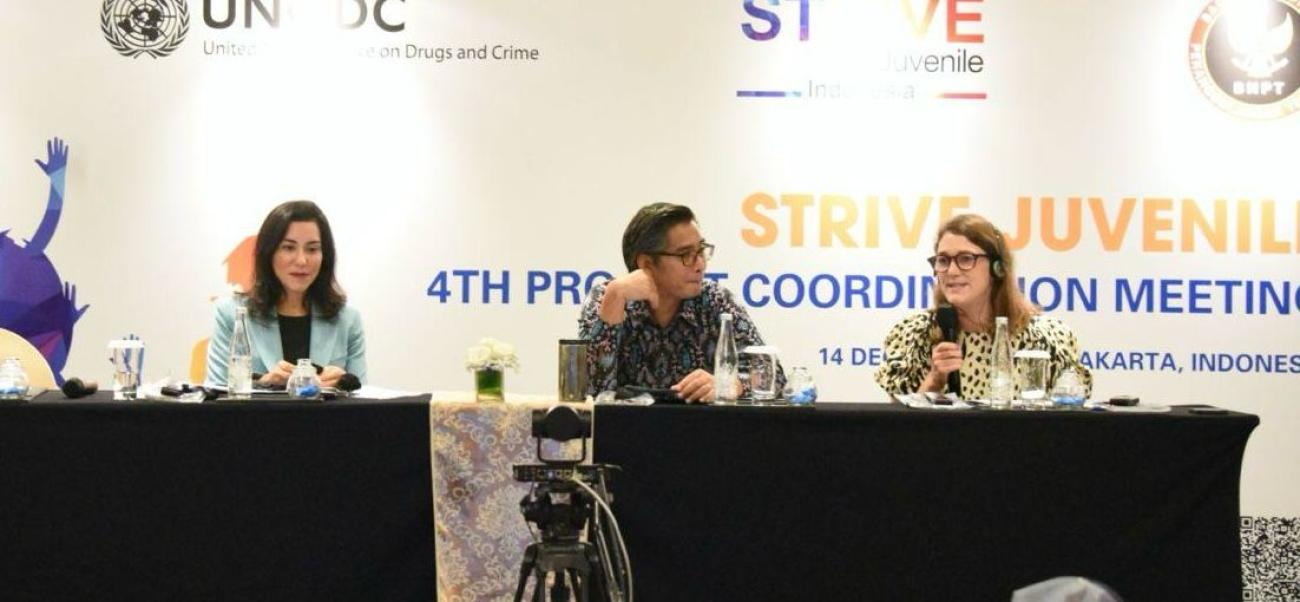STRIVE JUVENILE Indonesia: Safeguarding children from terrorism and violent extremism

--
“As a compassionate and responsible society, it is our duty to approach this issue with empathy and understanding, and to ensure that these vulnerable children receive the care and support they need to move forward from their experiences,” said Andhik Chrisnayudhanto, Deputy Head for International Cooperation, National Counter-Terrorism Agency (BNPT), opening STRIVE Juvenile Indonesia’s fourth Project Coordination Meeting on 14 December 2023 in Jakarta, Indonesia.
High-level national representatives from the security, child protection, justice and development sectors, as well as civil society gathered to celebrate and discuss three years of persistent efforts and achievements.
The meeting was led by BNPT and co-chaired by the European Union; and marked an important step in Indonesia’s efforts to prevent and respond to violence against children by terrorist and violent extremist groups.
A complex problem
Children are recruited and exploited by terrorist groups and are victims of their tactics. This serious form of violence has high costs for the children involved as well as for society at large.
“This is a very complex problem that cannot be effectively addressed in the short term or by individual agencies independently,” says Alexandra Martins, Leader, End Violence Against Children Team, UNODC. “To protect children from the scourge of terrorism, it is necessary to be guided by strong evidence, to identify political will, ensure effective coordination across multiple sectors and invest significant, long-term financial, human and operational resources for prevention of the phenomenon to be a priority.”
STRIVE Juvenile response
The STRIVE Juvenile project aims to address the challenges involved in supporting children associated with terrorist and violent extremist groupstowards effective rehabilitation and integration. This initiative recognises that the problem has an impact not only on the children affected but also on families and society.
Indonesia’s work under the STRIVE Juvenile project has yielded very encouraging results, including the first signs of changes in social norms and behaviours that are indicative of real change. The country has acted as a pioneer in the Association of Southeast Asian Nations (ASEAN) region and globally by:
-
Completing ground-breaking research on the association of children with terrorist groups, which has increased awareness and understanding of the phenomenon.
-
Adopting a unified whole-of-society and whole-of-government approach to tackling the phenomenon.
-
Strengtheninglegal reform and evidence-based policy frameworks for better protection of children.
-
Trainingover 200 professionals from different sectors in preventing child involvement with terrorist groups and promoting the rehabilitation and reintegration of those affected;
-
Awareness-raising initiatives that have reached over 14,000 children and strengthened their resilience.
Commitment and action
The ‘National Action Plan to Prevent and Counter Violent Extremism Leading to Terrorism’, adopted by Indonesia in 2021, emphasizes the importance of fulfilling children's rights. A comprehensive ‘Guidance on Coordination Mechanism for Protection of Child Victims of Terrorism Networks’isbeing developed with the support of STRIVE Juvenile and reflects Indonesia's commitment to protecting children from the devastating effects of terrorism.
Chrisnayudhanto, emphasized the importance of enhancing coordination among security, child protection, justice, health and education sectors to ensure that common goals are set,and strategies are aligned. “As representatives of BNPT, we are proud to facilitate such cooperation in practice.”
Global partnerships and way ahead
The recruitment and exploitation of children by terrorist groups knows no borders, which is why international partnerships are crucial. Indonesia works actively with UNODC, EU and ASEAN partners to address this regional and global phenomenon.
“It is an honour to partner with a Government that is committed to improving outcomes for children through regional and global advocacy as well as through strengthening rehabilitation and reintegration interventions at home, including for child returnees.” says Marc Vierstrate-Verlinde, Counter-Terrorism/Security Expert to South-East Asia, European Union.
STRIVE Juvenile Indonesiahas been a beacon of cooperation and success. The coordination meeting in Jakarta representeda critical milestone in the country’s efforts to prevent and respond to violence against children by terrorist and violent extremist groups.
“Indonesia, together with its international partners, has shown a strong commitment to tackling this complex problem with care, collaboration and strategic planning,” says Katie Blaikie, STRIVE Juvenile Project Leader. “At this stage of the project, we hope that our achievements will further inspire global efforts to protect children from the devastating effects of terrorism and violent extremism.”
STRIVE Juvenile: Preventing and Responding to Violence against Children by Terrorist and Violent Extremist Groups is funded by the European Union, and implemented by the United Nations Office on Drugs and Crime (UNODC) in three partner countries- Indonesia, Iraq and Nigeria. STRIVE Juvenile works with children and youth; and develops and implements comprehensive national responses to prevent and counter terrorism and violent extremism affecting children, in full respect of human rights, gender equality and international law. As such STRIVE forms integral part of UNODC’s 2030 Strategic Vision for Nigeria and its objective of promoting initiatives to support the victims of terrorism, in particular women and children recruited and exploited by terrorist organizations.
This article has been originally published in the United Nations' site through this link: STRIVE JUVENILE Indonesia: Safeguarding children from terrorism and violent extremism | United Nations (https://www.unodc.org/unodc/en/justice-and-prison-reform/strive/newsroom_strive-juvenile-indonesia_-safeguarding-children-from-terrorism-and-violent-extremism.html)



